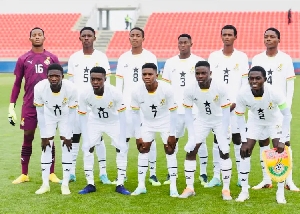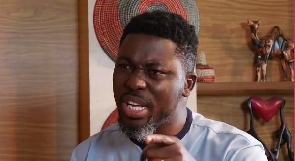- Home - News
- TWI News | TV
- Polls
- Year In Review
- News Archive
- Crime & Punishment
- Politics
- Regional
- Editorial
- Health
- Ghanaians Abroad
- Tabloid
- Africa
- Religion
- Election 2020
- Coronavirus
- News Videos | TV
- Photo Archives
- News Headlines
- Press Release
Opinions of Saturday, 21 March 2015
Columnist: Seidu Anas Sandow
Terrorism alert in Ghana: A myth or reality
Owing to the security alert on Wednesday, 10 December 2014, by some security experts in the country that “a number of Ghanaian nationals have offered themselves to train and be recruited into terrorist groups in the West African sub-region..”, the potential threat of terrorism in the Democratic Republic of Ghana; “the oasis of peace” cannot be confronted in isolation.
It needs an urgent attention by government, security agencies and stakeholders in order to prevent the scourge and spill-over of terrorists into the country. Based on the security tip-off, it presupposes that there is a close and effective communication between terrorist elements in the country and terrorist’s organizations abroad.
Hence, the need for the country to attach importance to any attempt at forging and promoting closer intelligence and security ties at the local, regional and continental level, to propose and discuss other possibilities before the country is grappled with crisis from takfiri insurgency.
The emergence of Osama bin Laden`s al-Qaeda, al-Qaeda in the Islamic Maghreb AQIM, Jama`atu Ahl -al Sunna Lida`wati wal Jihad(Boko Haram), Jabhat al-Nusra, Ahrar al-Shaam, Islamic State in Iraq and the Levant ISIL-ISIS, al-Shabab, Tahriq-i- Taliban of Pakistan TTP, Lashkar Jhangvi etc who seek to abolish Secular education, establish Islamic state and Caliphate, overthrow governments, introduce social, political and religious change through suicide bombing, crucifixion, abduction, decapitation, mutilation, rape and eating of human flesh are grim reminders of the high level of threats of Islamic insurgency and the need for political and religious leaders, commentators and the media to put these barbaric acts in their proper context devoid of propaganda and prejudice.
These sub- national groups seem to have started as peaceful religious organizations and later emerged as powerful insurgent forces and the deadliest Jihadist outfits in the world. Since these individuals, as a result of their malignant intent require internal and foreign funding and motivation to unleash violence on non combatant targets, the number of such potential Ghanaian terrorist elements who were said to have joined terrorist’s cells within the sub-region need to be identified.
Thus, the Ministry of the Interior in collaboration with the Ghana Immigration Service GIS, Custom Exercise and Preventive Service CEPS, Ghana Police Service GPS, Ghana Armed Forces GAF, Bureau of National Investigations BNI, West African Network for Peace-Building(WANEP)and other security apparatuses in the country after conducting and confirming the veracity of the security tip-off, may try to track the identity of such people and perhaps trace their locations, religious and sectarian affiliations, and the motivational factors that might have compelled them to join these Takfiri groups.
This may inform the security and intelligence agencies to track the movements and covert activities of potential terrorist’s cells that may be found in the country including those who appear to have undergone training and want to return home.
Similar miscalculations seem to have affected other nations in the Middle East, the West African sub-region, Europe and beyond whose citizens have joined Islamic militant organizations like ISIS-ISIL in the crisis-hit-Syria and Iraq, AQIM in Northern Mali, Jama-at Ahlu Sunna Lida`wati wal Jihad(Boko Haram) in north-eastern Nigeria etc. As a result, the activities of these insurgent groups now pose a significant set-back to national, regional and global security. A case in point is the recent Charlie Hebdo Magazine insurgent attacks that claimed 12 lives and wounded several others.
These extremist groups have threatened all communities like Shiite and other Muslims groups, Kurds, Christians including systematic ethnic cleansing in the Middle East, Africa, Europe and beyond. Ghana may need a collective approach that takes into account all the different elements required to fight this phenomenon. With a national commitment devoid of double standard, prejudice and greed the country could prevent the spill- over of terrorists and eliminate these unIslamic acts. Thus fighting this ominous phenomenon requires cooperation, commitment, firm and unconditional determination of the government, security agencies, the judiciary, religious institutions and all stakeholders.
This is in contrast to the type of commitment and cooperation adopted by individuals and countries who claim to champion the fight against terrorism whilst condoning it in their own backyard.
For instance, the vice president of the US Joe Baiden, Syrian president Bashar al-Asad, former and current Iraqi prime ministers Nouri al-Maliki and Haidar al-Abadi, US senator and former presidential candidate Ron Paul, Two former British army generals and a defense secretary such as Lord Dannatt, a former chief of the General Staff, Jonathan Shaw, a former assistant chief of the Defence Staff, and Liam Fox, the former defence secretary have been reported to have specifically accused Saudi Arabia, Turkey and Qatar of providing funding, training and arms to ISIS-ISIL, al-Nusra etc in Syria and Iraq.
Terrorism is unquestionably a cancerous tumor threatening the human race and an evil moving across all borders especially, at this crucial juncture, when the West African sub –region is passing through a critical period in its struggle against the forces of Islamic extremism, violence and terrorism. Only the spirit of togetherness, stronger inter and intra-state intelligence cooperation and robust counter-terrorism measure may help us prevent the spill-over and combat the menace.
Direct military campaign against terrorism seems to be no longer an effective mechanism. Once these extremists gain control over a particular area or territory, they become easily emboldened and sophisticated, especially when there is a foreign or domestic threat or use of military force to counter their belligerent activities.
A case in point is the war against al-Qaeda in Afghanistan and Iraq in 2002-2003, the Arab Republic of Syria in 2011, the Federal Republic of Nigeria in 2009 and the Democratic Republic of Mali in 2012. Foreign intervention most often than not seem to complicate the situation.
In this case, our security agencies may go an extra mile to align with the other regional and international intelligence who, as a result of security miscalculations have somewhat felt the venom and combated these Islamists insurgents.
Our security agencies need not be complacent; the fact that Ghana is said to have a robust security system does not warrant us to be unvigilant or lose focus. Most often than not, there seems to be some kind of secret alliance between terrorists cells and security personnel, political activists, domestic and foreign elements. As a result, terrorists have succeeded in maneuvering their ways and attacked security checkpoints and military barracks in the case of Buni Yadi in the northeastern part of Nigeria, Syria city of Raqa and Alepo, Fallujah in Iraq, etc.
Our judicial system may also adopt laws that will not constrain civil liberties but move to stanch the flow of foreign and internal fighters, prevent suspected terrorists from entering the country, enact laws prohibiting the raising of funds for terrorists groups, prevent citizens from travelling abroad to join these groups, to build an architect of counter-terrorism cooperation, to stop clerics and others from raising funds for extremists groups and laws that could also prevent terrorists from returning home to carry violent attacks.
Wrong but Legitimate Perception
The existence of threats of violence and terrorism especially by Islamists in the Middle East, Africa, Europe etc seem to make people erroneously find fault with Islam; the religion of peace and total submission to the will of Allah who is said to be a God of Peace, loves peace and promised to abundantly reward peace makers in this world and the hereafter.
There is no problem or difficulty with Islam as a religion. The problem seems to be rather Muslim extremists. Unlike other Scriptures and constitutions, the Holy Qur`an which is the primary source of Islamic Law is a Divine Scripture, believed to be Immune from errors, and so can neither be revised, amended or abrogated. Thus Muslims rather need to reform their hearts, spirits and their being.
Islam is certainly a way of life. No other people can define how Muslims ought to live their lives. The Qur`an and Sunnah have certainly defined how a Muslim life ought to be led. Unfortunately, the way and manner some Muslims define life through the interpretation of verses of the Holy Qur`an and Sunnah, seem to inform other people (non-Muslims) to erroneously and ignorantly smear Islam with dirt, caricature the Holy Prophet, desecrate the Holy Qur`an and condemn Islam as a religion of war, violence, extremism, barbarism and terrorism.
The perpetrators, such as the Jama-at Ahlu Sunna Lida`wati wal Jihad(Boko Haram), al-Qaeda, ISIS-ISIL, etc are certainly Muslims who seem to take fatwa from their spiritual leaders. They embark on suicide bombings, slaughter Muslims and Christians, rape, abduct women and children, eat human flesh like Abu Sakhar in Syria and desecrate the tombs of Prophet Muhammad`s companions like Hujr Ibn Adi, Ammar Ibn Yasir, with an Islamic Phrase `Allahu Akbar` God is Great with flags boldly written “La ilaha illallah” which means there is no god but Allah”.
Islam is practically interpreted according to varied stand points, where as some extremist groups see violence like suicide bombing, terrorism, decapitation, crucifixion, abduction, rape etc as acts of Jihad (holy war) that grants one automatic entry into heaven on the Day of Resurrection. Others also see it as alien to the norms and values of Islam. A case in point is the current crisis in the Arab Republic of Syria; According to BBC News 1 June 2013, Sheikh Yusuf al-Qaradawi, president of the International Union for Muslim Scholars who is said to be followed by 60 million Muslims and Sheikh Hassan al-Shafai from al-Azhar University, called on Muslims to join opposition forces in the Jihad(holy war) against Bashar al-Assad(the president of Syria) since his crackdown on anti-government protests was a fight against Islam.
Othman Batikh, the Tunisian Sunni Mufti however described calls for Jihad against the Syrian government a “huge mistake” that is not permitted under Islam. Saudi Arabia`s grand Mufti, Sheikh Abdul Aziz Al-sheikh also urged Muslims to refrain from fighting in Syria and warned Saudi Arabian preachers against encouraging young men to fight Assad in Syria during their sermons.
The lack of a unique and consistent Islamic verdict on sensitive jurisprudential issues and doctrines, such as Jihad coupled with extreme level of interpretation and adherence to the religion seem to question our credibility as people who claim to be adherents of peace. Once extremists take fatwa from their clerics and embark on violence of the highest magnitude, it becomes difficult for the same clerics like Sheikh Qaradawi, Hasan al-Shafai and their followers to condemn their acts until the prevalence of intense condemnation and pressure are mounted by local, national and international media.
Those who engage in violence like the Jama-at Ahlul Sunnah Lida`wati wal Jihad(i.e. people committed to the prophet Sunnah for Proselytism and Jihad ie Boko Haram), Islamic State in Iraq and the Levant ISIL, Islamic State in Syria ISIS, al-Qaeda in the Islamic Maghreb AQIM, al-Shabab, al-Nusra, Tahrik-i-Taliban Pakistan TTP, Lashkar-e- Jhangvi etc all cite and claim to be inspired by the Holy Qur`an and Traditions of Prophet Muhammad(s) as they slaughter, engage in suicide bombings, abduct and kill women and children; eat human flesh and the like.
This seems to suggest that the message `Muslims` send to each other (not only to none-Muslims) has also opened a new chapter of local, regional and international perception about Islam. It seems to confirm the suspicion and perception that the skeptics and critics harbor on Islam.
Islam means peace and total submission to the will of Allah. Islam plays an important role in reforming and developing the soul and personality of the individual which in turn positively affects the society as an integrated whole. It therefore, behooves on religious leaders and other stakeholders to call on potential Islamist insurgents in the country who may seek to attack soft or innocent targets on the altar of Islamic state, caliphate, Jihad and the like, to gather around the real teachings of the Holy Qur`an, Tradition of the Holy Prophet(s), embrace peace, tolerance, knowledge, dialogue, reason and to use the teachings of exemplary models to reform, de-radicalize and refrain from all acts injurious to Islam, one`s self and fellow humans so as to help consolidate and integrate a virtuous, peaceful and progressive Ghanaian society. The Holy Qur`an in this regard states: “O you mankind, surely We created you of a male and a female and We have made you races and tribes that you may get mutually acquainted. Surely the most honorable among you in the Providence of Allah are the most pious (most careful of his duty); surely Allah is Ever-Knowing, Ever-Cognizant.” Qur`an 49:13
Seidu Anas Sandow
Islamic Researcher









